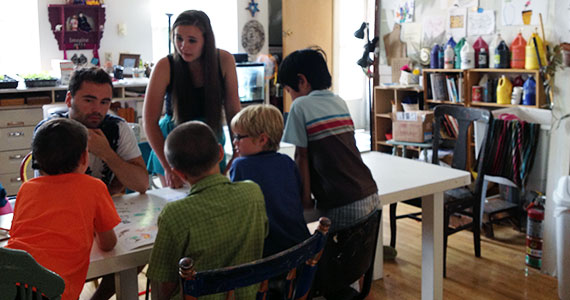Learning about and discussing social justice is not what most elementary-age students do during their summer vacations — but that’s just what eight students were recently able to do thanks to the efforts of Emily Luba ’16.
Luba, with assistance from James Mitchell ’16 and Hamilton Central School student Molly Stahl, created the weeklong Social Justice Through Creative Writing workshop, part of a camp held at the Hamilton Center for the Arts.
The topics — human rights, war and violence, climate change, poverty and food insecurity, and taking action — changed each day.
Surrounded by walls full of art, the students watched videos, like Kid President’s monologue How to Change the World, discussed the daily topic, listened to books, and did planned activities and games.
The second half of each workshop session was devoted to a creative writing prompt related to the day’s topic.
“It’s easy to feel bad about climate change, injustice or poverty but taking action to educate oneself more and even make a difference is a whole other battle,” asserted Luba. “Creative writing makes difficult subjects easier to digest.”
A and double major and tutor of creative writing at Hamilton Central School, Luba developed the idea during the school year.
It is one of three summer has taken on; she also is working through the at the nonprofits Waterville First and .
Professor Jennifer Brice and Upstate Institute project director Julie Dudrick helped Luba to find relevant resources and contacts to inform the workshop. Kathy Herold, from the allowed Luba to use the space, managed the logistics and brought in the students.
The workshop, held July 14-18, combined her academic and extracurricular interests in social justice, humanitarian affairs and sustainable development.
“My idea is that if kids are educated about social justice when they are young, they will have a better understanding of the topics as they grow up, which will transfer into adulthood,” explained Luba.
Despite their age, the elementary school students latched on to the difficult information. “It is a polluted world,” exclaimed Elijah Meyers, who said he now plans to stop polluting. Klara Burkhart-Skiages learned that “now there is more than half of the amount of slaves than there were in the 1800s. It’s really bad.”

